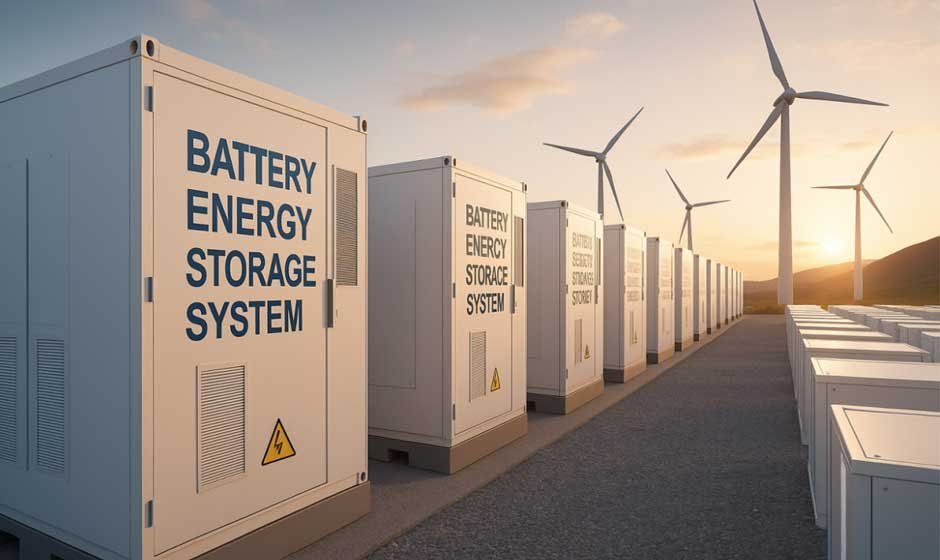Skip to the good bit
ToggleWhat is a Battery Energy Storage System (BESS) and why is it crucial in 2025? BESS technology is revolutionizing how we generate, store, and use energy, helping businesses, communities, and even households achieve efficiency, sustainability, and reliability. In this guide, you’ll learn how BESS works, its types, benefits, costs, and what you need to consider before making an investment.
What is a Battery Energy Storage System (BESS)?
A Battery Energy Storage System (BESS) is a technology that stores electrical energy in rechargeable batteries for later use. It’s essentially the bridge between intermittent energy production—such as solar and wind—and consistent consumer demand. Unlike traditional energy storage methods, BESS offers quick response times, efficient energy use, and the flexibility to adapt to modern energy demands.
Key Functions of BESS
- Energy Storage:Captures and stores electricity during low-demand periods for use during peak hours.
- Grid Stabilization:Provides rapid responses to fluctuations, ensuring steady power delivery.
- Renewable Integration:Stores excess solar or wind energy to prevent waste and ensure availability during low-generation periods.
- Backup Power:Ensures critical facilities like hospitals, data centers, and schools remain operational during outages.
Why BESS Matters in 2025
Energy systems worldwide are undergoing rapid transformation. The rise of renewables and electrification has made energy storage more vital than ever. Here’s why BESS is essential today:
- Renewable Maximization:Wind and solar are intermittent. BESS ensures that clean energy is stored and used effectively.
- Energy Cost Savings:By shifting electricity usage to off-peak hours, BESS reduces expensive peak demand charges.
- Resiliency:Provides backup power in the event of blackouts, ensuring energy security.
- Environmental Impact:Reduces dependence on fossil fuels, lowering greenhouse gas emissions.
- Regulatory Incentives:Many regions now offer tax credits and subsidies for BESS installation, making it financially attractive.
Types of Battery Energy Storage Systems
- Lithium-Ion Batteries
Currently the most widely adopted type, lithium-ion batteries offer high efficiency, compact size, and fast response. They’re common in both residential and large-scale projects.
- Flow Batteries
Known for long lifespans and durability, flow batteries are ideal for large-scale applications requiring frequent cycling.
- Lead-Acid Batteries
A cost-effective choice, these are often used for backup energy solutions, though they offer shorter lifespans compared to newer technologies.
- Emerging Technologies
- Solid-State Batteries:Offer higher energy density and improved safety over lithium-ion.
- Hybrid Systems:Combine different storage methods to achieve optimized performance and reliability.
Key Factors to Consider Before Investing in BESS
Choosing a BESS requires careful consideration. Below are the most important factors:
- Capacity:How much energy the system can store (measured in kWh).
- Power Rating:Determines how much energy can be delivered at once.
- Efficiency:Look for systems with high round-trip efficiency to minimize energy loss.
- Cycle Life:Refers to the number of charge/discharge cycles before performance declines.
- Safety Features:Ensure systems include thermal management, fire suppression, and meet global safety standards.
- Cost and ROI:Factor in both upfront investment and long-term savings from reduced energy costs.
Real-World Applications of BESS
Residential Use
Homeowners with solar panels use BESS to store excess power for nighttime use or during outages. This reduces reliance on the grid and lowers monthly bills.
Commercial Use
Businesses use BESS to lower peak demand charges and provide backup power, ensuring uninterrupted operations during blackouts.
Utility-Scale Projects
Utility companies deploy BESS for grid balancing, peak shaving, and renewable integration. Large installations support regional power stability.
Microgrids
Remote communities and critical facilities use BESS to maintain independent, reliable, and sustainable power systems.
Economic Benefits of BESS
- Lower Electricity Bills:By using stored energy during high-rate periods.
- Reduced Generator Dependence:Less need for costly and polluting backup generators.
- Grid Services Revenue:In some markets, BESS owners can sell stored power back to the grid.
- Long-Term Investment Value:Increased property value for homes and businesses adopting BESS.
Environmental Impact of BESS
BESS supports the global shift toward sustainability:
- Reduces carbon emissions by supporting renewable adoption.
- Minimizes energy waste by capturing excess generation.
- Decreases reliance on fossil-fuel peaker plants.
Challenges Facing BESS
While BESS has many advantages, it’s not without challenges:
- High Initial Costs:Though prices are dropping, upfront costs can still be significant.
- Battery Recycling:End-of-life battery disposal and recycling remain a global concern.
- Resource Availability:Lithium and other raw materials face supply chain pressures.
FAQ: Common Questions About BESS
Q: How long can a BESS provide backup power?
A: It depends on the system size. Residential units typically cover 4–12 hours, while large systems can last days when paired with renewables.
Q: How much does a BESS cost in 2025?
A: Residential systems range from $7,000–$12,000, while commercial and utility-scale systems vary widely depending on size and technology.
Q: Is BESS safe for homes and businesses?
A: Yes. Most systems are built with advanced safety features such as fire suppression, thermal controls, and compliance with international standards.
Q: Can I make money with BESS?
A: In some regions, yes. Programs allow you to sell excess stored power back to the grid, offsetting your energy costs.
At-a-Glance Takeaways
- BESS ensures reliable, sustainable, and cost-efficient energy management.
- Lithium-ion dominates the market, but flow and solid-state technologies are gaining traction.
- Consider capacity, cycle life, cost, and safety before investing.
- Incentives and subsidies make BESS more affordable in 2025.
Battery Energy Storage Systems are no longer just an innovation; they are the backbone of modern energy solutions. By maximizing renewable use, lowering costs, and ensuring resilience, BESS is transforming how we power our homes, businesses, and communities.







